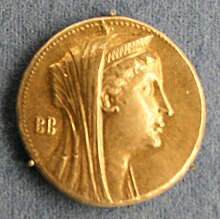Arsinoe I

Arsinoe I (Ancient Greek: Ἀρσινόη, 305 BC[1] – after c. 248 BC)[2] was queen of Egypt by marriage to Ptolemy II Philadelphus.
Life
[edit]Arsinoe I was the second daughter and youngest child born to King Lysimachus and Nicaea of Macedon.[3][4] Her older siblings were Agathocles and Eurydice.[3][4] Her ancestors were powerful—her paternal grandfather was Agathocles of Pella,[5] a nobleman contemporary to King Philip II of Macedon. Her maternal grandfather was the Regent Antipater.[6] Arsinoe I shared a name with her grandmother,[7] though it is unknown whether it was the mother of Lysimachus or of Nicaea as both women remain unnamed in ancient sources.[2] Little is known of her life prior to her marriage.
Queen
[edit]Between 289/88[8] and 281 BC,[9] Arsinoe I married her distant maternal cousin, Ptolemy II Philadelphus, pharaoh of the Ptolemaic Kingdom. The marriage was part of Ptolemy's alliance with her father against Seleucus I Nicator.[10] Through her marriage, she became queen of the Ptolemaic kingdom. Together, she and Ptolemy had three children: Ptolemy III Euergetes, Lysimachus of Egypt, and Berenice.[11]
Between after 279-274/3 BC Ptolemy's sister, Arsinoe II Philadelphos, arrived in Egypt. Arsinoe II had married Lysimachus and was therefore both step-mother and sister-in-law to Arsinoe I. Following the death of Lysimachus, Arsinoe II had married her half-brother, Ptolemy Keraunos, but fled to Egypt following a dispute. Soon after Arsinoe II's arrival, charges of conspiracy to assassinate Ptolemy II were brought against Arsinoe I.[10]
As a result of the charges, Ptolemy II convicted Arsinoe I of plotting against him. He repudiated her then exiled her to Coptos in Upper Egypt.[10] It is chronologically plausible that these events were also connected to the banishment of Ptolemy II's niece Theoxena, as Theoxena was sent to the Thebaid,[12] perhaps to Coptos as well.
Afterwards, Ptolemy II married his sister, Arsinoe II, and after her death, his children with Arsinoe I were officially regarded as the children of Arsinoe II.
Later life
[edit]Arsinoe I lived in exile for twenty years. During her exile, she lived in great splendour and enjoyed considerable privilege, since she was the former wife of a pharaoh. Her first son with Ptolemy II succeeded his father after his death.[8]
A surviving stele has been found at Coptos which refers to Arsinoe I.[10] The Stele is of Senu-sher, a steward of Arsinoe I and the Stele is assigned to Arsinoe I's exile.[13] The stele calls Arsinoe I the "king’s wife", but her name is not enclosed in the royal cartouche as was customary for an Egyptian queen.[10] Another piece of surviving evidence connected to Arsinoe I is a Phoenician inscription found at Masub inscription, considered to originate from Umm al-Amad, which counts the year by the reign of "Ptolemy, lord of kings, (the) great, (the) beneficent, son of Ptolemy and Arsinoë, the gods-brothers".[14] Larnakas tis Lapithou pedestal inscription, the Phoenician inscription found at Lapithos, Cyprus,[15] which is dated in the 11th or 12th year in the reign of Ptolemy II, may refer to a sacrifice instituted by Yatonba’al on behalf of "the legitimate scion and his wife",[15] hence refers to Arsinoe I. As Arsinoe I was disgraced as a traitor, the fact the person who did the sacrifice on her behalf strongly suggests that the news of her disgrace had not yet reached him.[15]
Issue
[edit]- Ptolemy III Euergetes.
- Lysimachus
- Berenice Phernophorus, married Antiochus II Theos, king of Syria.
References
[edit]- ^ Ptolemaic Genealogy: Arsinoe I, Footnote 4
- ^ a b "Arsinoe I". Ptolemaic Genealogy., Footnote 10
- ^ a b Bengtson. Griechische Geschichte von den Anfängen bis in die römische Kaiserzeit. p. 569.
- ^ a b Heckel. Who's who in the age of Alexander the Great: prosopography of Alexander's empire. p. 175.
- ^ "Lysimachus' article at Livius.org". Archived from the original on 2014-04-23. Retrieved 2020-03-26.
- ^ Lightman, A to Z of ancient Greek and Roman women, p.233
- ^ Ptolemaic Genealogy: Arsinoe I, Footnote 3
- ^ a b Lightman. A to Z of ancient Greek and Roman women. p. 43.
- ^ Ptolemaic Genealogy: Arsinoe I
- ^ a b c d e "Arsinoe I". Britannica Online Encyclopedia.
- ^ Ptolemaic Genealogy: Arsinoe I, Footnote 7
- ^ Ptolemaic Genealogy: Theoxena, Footnote 6 Archived November 26, 2011, at the Wayback Machine
- ^ Ptolemaic Genealogy: Arsinoe I, Footnote 8
- ^ Slouschz, Nahoum (1942). Thesaurus of Phoenician Inscriptions (in Hebrew). Dvir. pp. 44–45.
- ^ a b c "Arsinoe I". Ptolemaic Genealogy., Footnote 9
Sources
[edit]- Bengtson, Hermann (1977). Griechische Geschichte von den Anfängen bis in die römische Kaiserzeit. C.H.Beck.
- "Ptolemaic Genealogy: Arsinoe I". Tyndale House.
- "Arsinoe I". Britannica Online Encyclopedia.
- "Ptolemaic Genealogy: Theoxena". Tyndale House. Archived from the original on 2011-11-26.
- "Lysimachus". Livius.org. Archived from the original on 2014-04-23. Retrieved 2020-03-26.
- Heckel, Waldemar (2006). Who's who in the age of Alexander the Great: prosopography of Alexander's empire. Wiley-Blackwell.
- Lightman, M.; Lightman, B. (2007). A to Z of ancient Greek and Roman women. Infobase Publishing (Google eBook).
